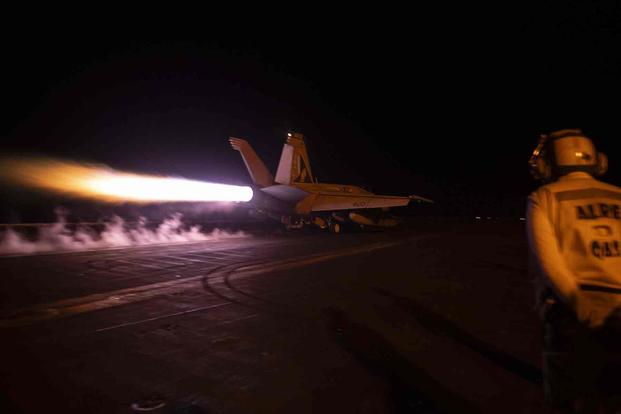Billions of dollars for U.S. military operations in the Middle East, where American troops have been under consistent fire from Iran-backed militants since October, are on the line as lawmakers bicker over U.S. border politics.
A long-awaited bipartisan Senate agreement to provide funding for the conflicts in Israel and Ukraine in exchange for U.S. immigration reforms includes $2.4 billion to support American military operations in the Central Command region.
The Senate is expected to take an initial procedural vote on the bill as soon as Wednesday. But conservative GOP complaints that the immigration provisions do not go far enough to "shut down" the U.S. southern border have put the fate of the entire package, including the Middle East funding and funding for weapons for Ukraine, into question.
Read Next: Navy Sinking Nearly $1 Billion into Barracks Construction Amid Revelations of Poor Living Conditions
"The United States and our allies are facing multiple, complex and, in places, coordinated challenges from adversaries who seek to disrupt democracy and expand authoritarian influence around the globe," Senate Majority Leader Charles Schumer, D-N.Y., said in a statement Sunday that touts that the bill "provides billions in vital investments in America's national security to address growing threats in the Middle East and Red Sea."
Meanwhile, House Republicans have proposed a bill focused solely on the Middle East that includes more than $3 billion for U.S. military operations there. Democrats, though, have dismissed that proposal as a political ploy that pits support for Israel against support for Ukraine and is aimed at denying President Joe Biden a win on border policy.
But House Republicans argue that the Middle East funding is too pressing to wait for agreement with the Senate on the larger bill, with House Speaker Mike Johnson, R-La., contending in a letter to colleagues Saturday that the upper chamber "eliminated the ability for swift consideration of any legislation" by excluding the House from talks.
The political fighting at home comes as U.S. troops have been battling Iran-backed militias in Iraq, Syria and Yemen in a tit-for-tat that has grown increasingly dangerous for American forces and has all the hallmarks of a regional conflict despite Pentagon statements to the contrary.
The militants in Iraq and Syria stepped up attacks on U.S. forces in those countries after the start of the Israel-Hamas war in the Gaza Strip in October. Houthi rebels in Yemen also started firing on ships in the Red Sea in what the Houthis claim is a show of support for Palestinians in Gaza.
Late last month, the attacks killed three U.S. soldiers who were serving at a logistics base in Jordan in support of the U.S. forces in Syria. More than 100 other U.S. troops have also been injured in the Iraq and Syria attacks. And while officials have been hesitant to say U.S. Navy ships, rather than commercial ships, are being targeted by the Houthis in the Red Sea, at least one Navy ship recently had a close call.
The U.S. responded to the deaths in Jordan with airstrikes on dozens of sites in Iraq and Syria on Friday in what officials described as the first step in a multi-tiered response. U.S. forces have also conducted nearly daily strikes in Yemen since a massive first wave of strikes Jan. 12.
With the Middle East violence showing no signs of abating soon and the costs of deployments and used weapons adding up, the Senate bill released Sunday would provide $2.4 billion for "U.S. operations, force protection, deterrence, and the replacement of combat expenditures in the United States Central Command region," according to the text of the bill.
Senators included border policy in the bill in an attempt to entice support from conservatives who increasingly oppose funding for Ukraine, which would get about $48 billion in U.S. military aid in the legislation. But border politics are now threatening to sink the entire package.
House Republican leadership has rejected the Senate bill over their opposition to the legislation's immigration provisions, making it unclear what path there is to funding the Middle East military operations.
"Any consideration of this Senate bill in its current form is a waste of time," Johnson and the rest of his leadership team said in a joint statement Monday. "It is DEAD on arrival in the House. We encourage the U.S. Senate to reject it."
A competing House Republican plan released Saturday would provide $3.3 billion in personnel, operations and procurement funding for the ongoing U.S. military operations in the Middle East. The House will vote on the GOP bill this week, Republican leaders have said.
But leaving out aid for Ukraine and any attempt to address what Republicans have described as a "crisis" at the southern border makes the House plan unlikely to become law, too. In a statement Saturday, the White House rejected the House proposal as a "cynical political maneuver."
Related: Army Still Weighing Combat Awards for Soldiers Hit by Deadly Drone Attack at Jordan Base














